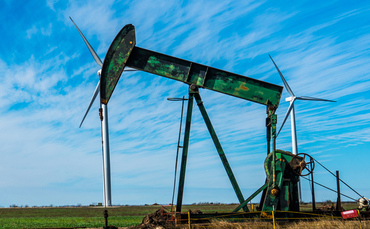The oil and gas rally has been one of the few places to profit amid a maelstrom of macroeconomic headwinds, but its catalyst of Russia's illegal invasion of Ukraine has left a sour taste on the returns.
When Russia invaded Ukraine on 24 February, it singularly ignited a sleeping energy crisis, which contributed to generational high levels of inflation throughout the year and laid bear the reality of underinvestment in the energy transition and security.
"Energy has been a scarring event this year, it has been the one place to hide, and if you did not have it you had a relatively tough time...and many people got that wrong," said Kamal Warraich, head of equity fund research at Canaccord Genuity Wealth Management.
No other place to hide
Since the start of the year, the MSCI ACWI/Energy index has raced ahead of major equity markets, returning 42.8%, according to data from FE fundinfo.
The second highest returns came from the FTSE 100, which is dominated by oil and gas majors, but it still only returned 2.9% by comparison.
Matthews Asia CEO: ESG speaks from the perspective of a rich country
Most experts agreed that energy will continue to be a major theme in 2023, both in markets and politically.
Michael Field, European equity market strategist at Morningstar, said it would be a "key theme in 2023 and beyond" and will "remain at the forefront of investor minds".
However, investors must beware the risk over the next year if they anticipate a repeat performance of 2022, which Warraich explained is not a guarantee.
He said it was a habit of investors to take the recent experience as an indicator of the near future, often "moving as a crowd".
"People need to be quite careful that you do not conflate investment return with current data, and extrapolate that out as if energy will keep delivering like this, because the cycle is a real thing with cyclical companies, such as energy assets," he said.
Energy in a recession
Victoria Scholar, head of investment at interactive investor, explained the energy sector broadly moves in line with the economic cycle, which for most economies is looking down the barrel of a recession.
She said a recessionary environment reduces business and consumer activity, in turn resulting in weaker demand for energy.
At present, there are some colliding factors which make this a less sure outcome.
'A great step forward for history': Nations promise to protect 30% of Earth by 2030
Mark Hume, co-manager of the BlackRock Energy and Resources Income trust, noted the underinvestment in new oil production as part of the green energy plans "suggests tightness in energy markets persists, leading to stronger for longer oil and gas prices".
Warraich described China as the "wild card", as the world's biggest coal consumer emerges from its Covid lockdowns.
But many managers he spoke to have called time on their energy allocations, taking the profits from oil and gas and investing it elsewhere.
Governments have already levied several windfall profit taxes on the oil and gas conglomerates, a material headwind on returns.
"From an investment point of view, you could argue that you have had the bulk of your returns for the near term," Warraich said, something Tom Nelson, manager of the Ninety One Global Natural Resources fund, agreed with.
He said: "We think 2023 will be another positive year for energy sector performance, but not as strong as 2022."
Energy transition
‘Transition' has been a buzzword within energy this year, with some claiming a move to renewable sources is the only true solution to a long-term energy crisis.
Renewable energy and a divestment away from fossil fuels has been an enduring topic within markets, and a core theme among ESG investors.
David Bird, manager of Octopus Renewables Infrastructure trust, said: "The future is green and energy transition will continue to gain pace, so investments should continue to be accelerated in this sector as opposed to outdated fossil fuel-based energy."
Deep Dive: Renewables key to 'plug the chasm' in energy transition
Not everyone agreed on the latter though, including Amati Global Investors founder Paul Jourdan, who described one of the most neglected factors about the energy transition topic.
"Replacing fossil fuels with energy from wind and solar, even just in transport, will require a massive degree of industrialisation of the natural world, because these are not energy dense forms of generation," he said.
"The building of wind turbines and PV panels itself is powered largely by fossil fuels and will be curtailed if these are not available or become too expensive," Jourdan added.
Indeed, Morningstar's Field choose both Shell and Ørsted as his top picks for 2023.
Enter nuclear and hydrogen
One returning narrative in 2023 is a shifting view on energy assets that were previously excluded by some from the green energy picture, particularly nuclear and hydrogen.
In the Autumn Statement, the UK government announced plans to build the first new nuclear power station in a generation at Hinkley Point and on 13 December published the UK Hydrogen Strategy update to the market: December 2022, outlining the government's action to advance the hydrogen economy.
All this needs to be framed within a continuously difficult macroeconomic backdrop, as Scholar said: "Fears about energy security, the war in Ukraine, and post-pandemic inflation have all somewhat demoted ESG from the top of the political agenda this year. ESG could come back into focus in 2023 as price pressures ease.
"However, the fear of recession is likely to take centre stage with governments trying to kick-start growth once inflationary pressures starts to ease."


